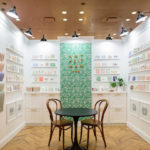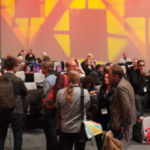The American Society of Clinical Hypnosis’ (ASCH) Annual Scientific Meeting and Workshops, which last year took place at the Westin in Charlotte, N.C., on March 16-20, is attended by approximately 400 medical and mental-health practitioners. Thirty-five to 40 of them generally fall under the “beginning” or “intermediate” levels of education — meaning they’ve never attended any of ASCH’s meetings or workshops, or may have attended a workshop or two, but never the Annual Meeting.
Members of ASCH’s 2012 meeting planning committee, including Director of Education and Meetings Emma Leighton, were hoping to find ways to foster networking and communication between these newer attendees and their more experienced counterparts. To that end, Leighton, who had recently read a journal article about gamification, suggested to the program chair that ASCH introduce games as part of its programming, and the chair agreed.
The article suggested Jenga or group crossword puzzles, but ASCH’s team was looking for something that required more attendee interaction. “You can move a Jenga piece or answer a crossword clue or circle a letter, and never interact with anybody,” Leighton said. “So the program chair was very adamant about interaction, new people meeting older people — because they tend to have some attendees who come to the meeting and hang with the same people every year.”
The group settled on a modified version of Scrabble in which different letters (removable in case anyone chose to opt out) were affixed to Annual Meeting attendees’ name badges.
The goal was for them to get together with their colleagues during the welcome reception and create words with their letters. The kicker? Beginner- and intermediate-level attendees had all the vowels, which meant that they were very valuable commodities. It also meant that they were unable to create words with fellow beginners, and instead were forced to seek out more seasoned attendees, who held all the consonants.
“We had the instructions in [attendees’] welcome packets that explained, just like in Scrabble, that every letter is worth a certain number of points,” Leighton said. “We encouraged them to …take their letter and make words related to hypnosis.”
Organizers set up a table with program volunteers where attendees checked in once they had created a word. Those committee members judged the words, awarding gift cards to the groups that created the longest, most obscure, and highest-scoring words.
The game was so popular that attendees continued playing it after the welcome reception, throughout the duration of the meeting. “Some individuals were making words and not even coming over to us,” Leighton said, “and other people were making words the entire time we were at the meeting. …We only had two evening events, so [attendees] made [words] then, and I also saw them in the hallways on breaks going, ‘Hey, you’re G! I’ve needed the G all week!’”
Breaking the Ice
One of ASCH’s goals at its 2012 Annual Meeting was to break down the barriers that sometimes occur between attendees of different specialties. “We have a wide, diverse group of professionals within the medical and mental-health communities,” said Emma Leighton, director of education and meetings, “and as you might imagine, there are some rivalries where some individuals in certain professions feel that they’re more important than others.…We wanted to find a way to eliminate any kind of perceived superiority and create a level playing field.”
Can a game help do that? Matthew E. May, founder of Edit Innovation, which specializes in helping leaders strengthen their capability for innovation, quotes innovation expert Stephen Lindegaard in a recent blog post titled “Better Ideas Through Gamification”: “Gamification has the potential to eliminate cultural or status biases that can skew outcomes.” It can also “encourage collaboration and constructive competition.”



